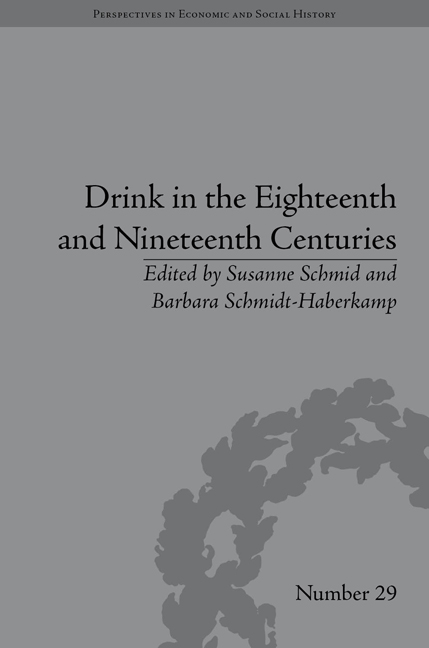Book contents
- Frontmatter
- CONTENTS
- Acknowledgements
- List of Contributors
- List of Figures and Tables
- Introduction
- Part I Ritual and Material Culture
- Part II Institutions and Social Class
- Part III Temperance and the Misery of Alcohol
- Part IV Intoxication and Therapy
- 9 Alcohol, Sympathy and Ideology in George Gissing's The Nether World (1889) and The Odd Women (1893)
- 10 Legends of Infernal Drinkers: Representations of Alcohol in Thomas Hardy and Nineteenth-Century British Fiction
- 11 The Spirit of Medicine: The Use of Alcohol in Nineteenth-Century Medical Practice
- Part V Case Studies: Rum, Cocoa and Magical Potions
- Notes
- Index
11 - The Spirit of Medicine: The Use of Alcohol in Nineteenth-Century Medical Practice
from Part IV - Intoxication and Therapy
- Frontmatter
- CONTENTS
- Acknowledgements
- List of Contributors
- List of Figures and Tables
- Introduction
- Part I Ritual and Material Culture
- Part II Institutions and Social Class
- Part III Temperance and the Misery of Alcohol
- Part IV Intoxication and Therapy
- 9 Alcohol, Sympathy and Ideology in George Gissing's The Nether World (1889) and The Odd Women (1893)
- 10 Legends of Infernal Drinkers: Representations of Alcohol in Thomas Hardy and Nineteenth-Century British Fiction
- 11 The Spirit of Medicine: The Use of Alcohol in Nineteenth-Century Medical Practice
- Part V Case Studies: Rum, Cocoa and Magical Potions
- Notes
- Index
Summary
In recent years international studies have highlighted the health benefits of moderate alcohol consumption. A. S. St Leger, A. L. Cochrane and F. Moore have emphasized what has been described as the ‘French Paradox’: high fat and alcohol intake has resulted in a reduced rate of heart disease among the French population. This was largely seen as being due to polyphenols in wine, such as resveratrol. However, the health benefits of flavonoids in stouts and dark beers have also been isolated and led University of Wisconsin researchers to reiterate the famous advertising slogan of the interwar period: ‘Guinness is good for you’. Claims are generally based on the antioxidant effects of these chemical substances, said to scrub the bodily system of free radicals, mitigating the threat of blood clots and even cancer.
Such studies are part of a long tradition in the history of medicine. Almost sixty years ago, similar arguments were made by Salvatore Lucia, former professor of medicine and lecturer in medical history (Department of Preventive Medicine, San Francisco), in Wine as Food and Medicine, the title being suggestive of an earlier dual role for alcohol, which created tensions throughout the long nineteenth century. Lucia's assertions equally involved isolating the health-giving constituents of wine, including aldehydes, ketones, esters and tannins. This renewed interest in alcoholic beverages was stimulated by the repeal of the Eighteenth Amendment in 1933, ending American prohibition.
- Type
- Chapter
- Information
- Drink in the Eighteenth and Nineteenth Centuries , pp. 127 - 140Publisher: Pickering & ChattoFirst published in: 2014



